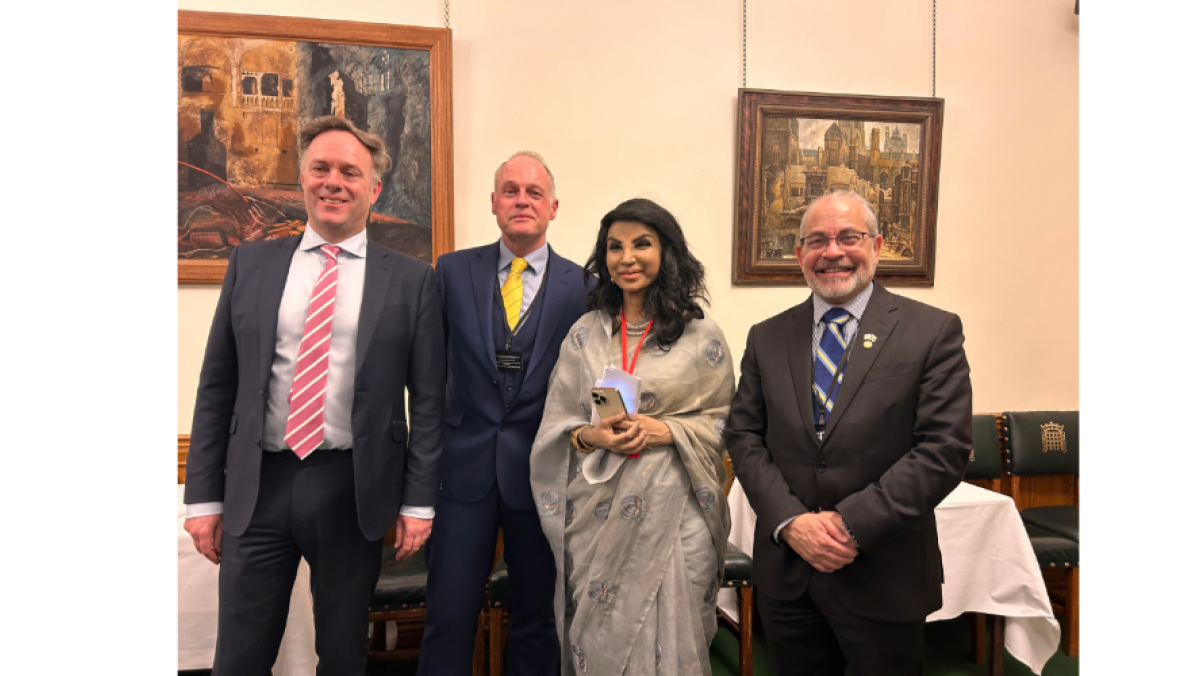
L-R Julian Sturdy MP, Prof Timothy Walsh, Ms. Saida Tasneem, Bangladesh High Commissioner to the UK, Ireland and Liberia and Mr Milton Inniss, High Commissioner of Barbados to the UK
The IOI co-hosted a meeting for ambassadors and senior members of London’s diplomatic network at the House of Commons on 28 February to discuss the importance of a united approach to tackle the growing threat of antimicrobial resistance (AMR).
The meeting was co-hosted by the IOI, BSAC and the High Commissions of Bangladesh and Barbados. It was attended by ambassadors and high commissioners of 20 countries, members of the All-Party Parliamentary Group on AMR, and representatives of the WHO, UNICEF, Asian Infrastructure Investment Bank, and the G7 and G20 Health and Development Partnership.
World leaders will come together for a UN High Level Meeting on AMR during the UN General Assembly in September 2024. In the lead up to the UN High Level Meeting, the IOI and BSAC have been working with ministers and world-leaders to provide up-to-date evidence about the spread of AMR and offer pragmatic ways to arrest and reverse the impacts of AMR.
Ms. Saida Tasneem, Bangladesh High Commissioner to the UK, Ireland and Liberia said, “Prime Minister Sheikh Hasina has always been in the forefront of building political momentum and visibility of AMR on the global health and development agenda; and it was really encouraging to see more countries and experts across sectors attend our meeting in the UK parliament, and agree on the need of a coordinated approach.
“Our planet is deeply interconnected economically, culturally, and socially. The impact of AMR across the globe will mirror that of climate change. And just like climate change, low-middle income countries will bear the maximum burden of untreatable infections and deaths due to AMR.”
Mr Milton Inniss, High Commissioner of Barbados to the UK said,“What role can we play within the diplomatic community to help combat this impending crisis? Our voices can be added to the national, regional and international discussions being held on this matter. We can have meaningful discussions with our relevant Ministries - are AMR mitigation measures adequately incorporated in our national policies - do they align with the One Health approach?
“Our voices are needed at the regional and international levels in all the multilateral fora in which we operate. We need to urge our political leaders to agitate for meaningful outcomes coming out of the United Nations’ High-Level Meeting on Antimicrobial Resistance (AMR) in September.”
“Let us join together in the fight against AMR.”
Julian Sturdy Member of Parliament for York Outer said, “It was fantastic to bring together Ambassadors, High Commissioners, charities and experts to reaffirm the importance for there to be a global strategy to tackle antimicrobial resistance. We must work together and act now if we are to avoid a health emergency.
“I had lots of encouraging discussions last night but we must ensure that this leads to action. The UNGA High Level Meeting this year is a once in a generation opportunity to change our course and unite for a better world.
“The solutions are known, there is a deal to be done."
Prof Timothy Walsh, Director of Biology, Ineos Oxford Institute for antimicrobial research (IOI), said, “Within the space of a century, antibiotics have gone from being a ground-breaking discovery and saving lives of millions during World War Two, to losing their effectiveness and making routine procedures such as childbirth and cancer treatments life-threatening again.
“The effects of AMR are consistent worldwide, and a global crisis of this magnitude requires a collective and orchestrated response across countries and sectors. The fact that the meeting was attended by the most senior representatives of countries, financial institutions and charities in London highlights the urgency of this challenge.
“We think a top priority for the group is likely to be the generation of a plan that would see those regions of the world disproportionately negatively affected by antibiotic-resistant infections gain access to adequate water, sanitation and hygiene facilities, affordable diagnostics, and life-saving antibiotics.
“We hope that this meeting provided a launchpad for the world’s decision makers to agree on the importance of a global consensus on AMR.”
Find out more about IOI's engagement with international governments in the lead up to the UN High Level Meeting on AMR here: Global action against AMR | Ineos Oxford Institute
